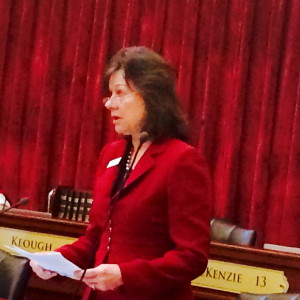Legislative budget-writers talked Monday about the rising cost of college tuition — and how to help high school graduates stay in school.
But ultimately, the Joint Finance-Appropriations Committee took no immediate action to offset college costs. In the process, the committee appeared to take the final step to bury Gov. Butch Otter’s “tuition lock” proposal.
JFAC endorsed a $279.6 million budget proposal for higher education. That would be an 8 percent increase, but slightly below the 8.8 percent increase Otter requested.
The committee discussion, such as it was, centered on college affordability.
Rep. John Gannon, D-Boise, urged budget-writers to add another $6.3 million into the higher education budget to fund 3 percent salary increases on college campuses. By doing this, the State Board of Education would be in a better position to hold the line on college tuition, which has increased rapidly since the Great Recession. “It’s just an enormous burden on these kids.”
JFAC members said they were sensitive to the tuition issue, but voted down Gannon’s request.

The committee didn’t discuss Otter’s $10 million “tuition lock” proposal at all. That move wasn’t much of a surprise. Otter’s plan — designed to freeze tuition rates from a student’s freshman year through senior year — never gained much traction in the Legislature.
JFAC member Rep. Wendy Horman, R-Idaho Falls, acknowledged the need to discuss college tuition. “I look forward to that conversation in the coming months.”
The higher education budget now must pass the House and Senate before going to Otter’s desk.
In other Statehouse action Monday:
Bible-in-schools bill. The Senate gave bipartisan backing to a bill to reaffirm the role of the Bible as a reference work in Idaho schools.
Senate Bill 1342 says the Bible and other religious texts can be used as a reference in discussing more than a dozen academic disciplines. The Bible is already permitted in Idaho classrooms. But the bill’s sponsor, Sen. Sheryl Nuxoll, R-Cottonwood, said SB 1342 would provide clarification and “safe harbor” to Idaho teachers.

Supporters pointed out that SB 1342 would repeal an outdated section of state law, which says Bible selections “shall be read daily to each occupied classroom in each school district.” Opponents objected to the fact that the bill mentions only the Bible by name; Sen. Janie Ward-Engelking, D-Boise, said the bill would open the door to inserting a “laundry list” of religious titles into state law.
SB 1342 passed 31-3, with dissenting votes coming from Ward-Engelking and Sens. Grant Burgoyne and Maryanne Jordan, also D-Boise. The bill now goes to the House.
Parental rights. Moments after passing the religious texts bill, the Senate also gave bipartisan backing to a bill designed to reaffirm parental rights.
Senate Bill 1293 asserts that parents and guardians play a primary role in charting the course of their children’s education. School administrators are required to make a reasonable attempt to accommodate parental wishes, “without substantial impact to staff and resources.” The bill narrows the scope of a more sweeping 2015 parental rights law that has prompted concerns from school officials.
SB 1293 passed 32-2, with no votes from Burgoyne and Sen. Dan Schmidt, D-Moscow. It now goes to the House.
College scholarships. The House gave unanimous backing to a bill to provide matching scholarships to students who earn college credits while in high school.
Under House Bill 477, students can receive a two-year full tuition scholarship for earning an associate’s degree in high school. Students can earn a $1,000-a-year scholarship for earning 10 to 19 college credits while in high school; they can earn $2,000 a year if they earn 20 or more credits while in high school.
However, scholarship recipients must attend college in Idaho. And with 70 percent of Idaho’s associate degree recipients continuing their education out of state, that’s an important consideration. “We want students to stay in Idaho to go to college,” said Rep. Ryan Kerby, R-New Plymouth, the bill’s sponsor. “Stay here and help us out.”
With Monday’s 66-0 vote, HB 477 heads to the Senate.
Broadband budgets. Idaho’s ever-changing school broadband picture was a recurring theme, as JFAC hammered out state superintendent Sherri Ybarra’s office budgets.
First, budget-writers opened up Ybarra’s 2015-16 budget and pulled $5.5 million out of the spending plan. That’s because the state won’t need as much money to cover high-speed Internet in the high schools. Last spring, in the wake of the Idaho Education Network implosion, the Legislature set aside $7,036,300 to help school districts replace their broadband system.
That $5.5 million goes back into the state’s budget kitty — where it could go into other programs or into savings.
Later Monday morning, JFAC approved a $14.2 million general fund budget for Ybarra’s office for 2016-17. That budget includes nearly $3.4 million for “ongoing and expanded” school broadband, with about $1.8 million to expand broadband services into elementary and middle schools.
The 2016-17 budget for Ybarra’s office is separate from the $1.6 billion budget proposal to fund Idaho public schools; JFAC endorsed that K-12 spending plan last week. The budget for Ybarra’s office also must pass the House and Senate before going to Otter’s desk.
Charter schools. The Senate Education Committee gave unanimous approval to a bill that could allow groups to operate multiple charter schools in Idaho.
Senate Bill 1376 would allow the same board to govern multiple charter schools — although each school would have to remain “independently accountable for its academic, financial and operational outcomes.” The charter groups would also be allowed to contract with third-party educational services providers, which could be nonprofit or for-profit groups.
Several charter school advocates spoke for the bill, saying it would allow successful charters to replicate their services elsewhere in Idaho. “This bill provides the certainty we need as we look to expand our reach in Idaho,” said Will Bogdanoff, deputy director of Sage International Charter School in Boise.
No one debate against the bill.
SB 1376 now heads to the Senate floor.
Computer science. A bill to launch an Idaho computer science initiative is on its way to Otter’s desk.
Under House Bill 379, passed Monday on a 34-0 vote, Idaho would work with a national group to craft and adopt computer science standards, and work to provide training for computer science teachers.
State funding for the initiative would come from Idaho’s STEM education fund. For now, there is no money in the fund to support long-term science, technology, engineering and math programs. Otter has requested $10 million for the fund, with $2 million of spending authority in 2016-17; JFAC hasn’t yet proposed a budget for the new fund.
